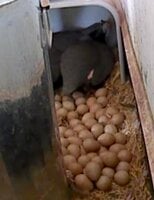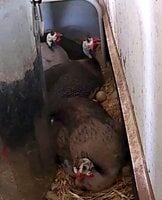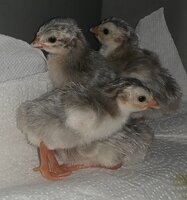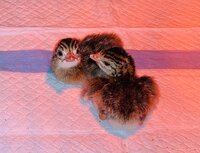Hi All, I previously posted questions pic about my communal clutch of guinea eggs in their coop. There are currently five hens incubating that nest (gratuitous guinea cam pic attached!). I started counting from the first night that a hen stayed on the nest at night instead of roosting. Since then, numerous eggs have been added and more hens have joined, the last joiner about 10 days ago. I’ve also now (like today) hatched six of their keets in an incubator. As @R2elk previously suggested, the guineas have struggled to incubate this large nest well. I’m now at “Day 30” of nest incubation. Yesterday, the Guineas had kicked a dirty, yolk encrusted egg outside the nest and they previously removed two broken eggs. It was pretty rotten inside, but moms scolded me for taking it. I’d like to candle their eggs but am afraid that they will abandon the nest (and attack me!) if I’m that pushy. I’m rapidly reaching the point of decision making for their nest... My DD wants to save their eggs, incubate any still viable. I’m not as sure... The purpose for letting them have this nest was: 1) train them to use the coop for nests instead of wild nests that were attracting predators 2) raise keets from within the flock so as to avoid what will be a difficult integration. If 2) won’t be possible, then is it helpful to disturb their nest and hatch more keets inside, keets that I’d then need to find a buyer for, at $3 each? I’m not sure what would happen with the nest if I do/don’t intervene, but avoiding wild nests has become a pretty high priority... It’s probably too much to hope for, but I’d be perfectly happy to have them be broody long enough to cease laying for this year altogether, though moms are looking pretty thin... I went ahead and put the 28% protein game starter in their feeder (previously chick starter) hoping to keep the hens from losing much more weight... I guess my questions are this: 1) any idea how long they will stay broody on a nonhatching nest? Will they kill themselves trying to brood it, as some chickens will? 2) anyone ever had success getting broody guinea hens to adopt newly hatched keets? If so, how did you do it? I was wondering what they’d do if I brought a cage of keets out to the coop for the day... I’m assuming that slipping keets under hens at night won’t work, as my guineas seem aware at night and likely to go ballistic if disturbed... Thanks for reading this long post!
Navigation
Install the app
How to install the app on iOS
Follow along with the video below to see how to install our site as a web app on your home screen.
Note: This feature may not be available in some browsers.
More options
You are using an out of date browser. It may not display this or other websites correctly.
You should upgrade or use an alternative browser.
You should upgrade or use an alternative browser.
Questions about large communal nest
- Thread starter Mixed flock enthusiast
- Start date
I had two guinea hens using a communal nest this spring. But since one of them started around a week after the first one there were eggs in different stages of development. I wanted to steal some of the eggs so they wouldn't have so many to cover but there was always a hen on the nest. So I just put on some gloves and started taking eggs when there was only one hen there. She jumped off the nest and complained very loudly about it. But I left about 10 eggs for the two hens to incubate and put the rest in the incubator. I had buyers for the keets and it is easier to steal eggs than it is to steal keets from very aggressive mommas! They were back on the nest just as soon as I finished and stayed with it. They ended up hatching 6 keets and the ones in the incubator hatched one or two a day for about 10 days. 
p.s. It's unlikely that the hens will adopt keets that they haven't hatched unless they have newborns themselves. And it is dangerous for the keets to try to put them with 'ballistic' hens.

p.s. It's unlikely that the hens will adopt keets that they haven't hatched unless they have newborns themselves. And it is dangerous for the keets to try to put them with 'ballistic' hens.

- Thread starter
- #3
Thanks for sharing your experience! I’m encouraged to hear that they didn’t abandon the nest when you disrupted it... On the other hand, it’s getting so hot now, I hate to see how much they are panting during the heat of the day. I’m wrestling with trying to help them hatch a few keets to integrate into the flock versus taking the nest apart so they will put on weight plus cool off during the hottest part of the day. If I do decide to keep trying with this nest, given my goals with them, maybe I should wait until 3 are off the nest (happens once a day when really hot like it is now) lock them out of the coop, and candle eggs not under the remaining two guineas for bad and clear eggs? Maybe if I took some excess eggs away they’d manage to hatch a few keets? I guess that could also help me judge whether there are really keets that could hatch soon or if the nest is just hopeless... If they give up on the nest, any idea how long until they resume laying, given their thin condition?I had two guinea hens using a communal nest this spring. But since one of them started around a week after the first one there were eggs in different stages of development. I wanted to steal some of the eggs so they wouldn't have so many to cover but there was always a hen on the nest. So I just put on some gloves and started taking eggs when there was only one hen there. She jumped off the nest and complained very loudly about it. But I left about 10 eggs for the two hens to incubate and put the rest in the incubator. I had buyers for the keets and it is easier to steal eggs than it is to steal keets from very aggressive mommas! They were back on the nest just as soon as I finished and stayed with it. They ended up hatching 6 keets and the ones in the incubator hatched one or two a day for about 10 days.
p.s. It's unlikely that the hens will adopt keets that they haven't hatched unless they have newborns themselves. And it is dangerous for the keets to try to put them with 'ballistic' hens.
When will they resume laying.... I can't say for sure. I left two keets with the two hens so they could raise them and integrate the little ones into the flock. The babies are now 5 weeks old and I haven't found any eggs from the hens. I have my two hens separated from the males in a small coop and pen. So that may make a difference in them wanting to lay eggs again. If a hen loses all her eggs or babies she will start to lay again depending on the hen's age and how late in the year it is. Some hens will and some hens won't. 
If I were you, I would be stealing as many eggs as I could and putting viable eggs in the incubator. It's not hard to find buyers for baby guineas. Unless you are really wanting to increase the size of your flock, It might be better for the hen's health to just take all the eggs. They will complain but they adjust quickly. The only problem with that is that they will not likely use that nest again.
I often candle the eggs under chicken hens so they won't be sitting on infertile eggs. But it's not as easy with guinea hens.

If I were you, I would be stealing as many eggs as I could and putting viable eggs in the incubator. It's not hard to find buyers for baby guineas. Unless you are really wanting to increase the size of your flock, It might be better for the hen's health to just take all the eggs. They will complain but they adjust quickly. The only problem with that is that they will not likely use that nest again.
I often candle the eggs under chicken hens so they won't be sitting on infertile eggs. But it's not as easy with guinea hens.

- Thread starter
- #5
I have 7 female guineas and 1 male. I don’t feel like they have a very normal flock structure and it’s hurting their ability to survive free ranging. Plus, I only have the one male so will need to get keets again myself if I lose him. For an example of their wonky flock dynamics, this nest started when I locked them in the coop/run after a female guinea was taken by a bobcat. She was taken when she was visiting the coop of her rooster boyfriend, since she was one of four outcasts of the guinea cock’s main harem. My coop for them is on the small side, so I’m building a new one in the fall but I decided I don’t want to wait so long to add flock members. I did just hatch six of their babies, which I collected after a black rat snake invaded their nest and the females all temporarily abandoned it. So, if they can’t hatch babies on their nest then I’ll try to integrate these babies when bigger; I’d just much prefer to add babies that they’ve hatched to avoid the integration hassle and drama. I figured that they wouldn’t hatch a lot of their own eggs on this nest, but I thought that they’re hatch SOME! Here’s a pic of four of their babies, two more are drying off in the incubator.When will they resume laying.... I can't say for sure. I left two keets with the two hens so they could raise them and integrate the little ones into the flock. The babies are now 5 weeks old and I haven't found any eggs from the hens. I have my two hens separated from the males in a small coop and pen. So that may make a difference in them wanting to lay eggs again. If a hen loses all her eggs or babies she will start to lay again depending on the hen's age and how late in the year it is. Some hens will and some hens won't.
If I were you, I would be stealing as many eggs as I could and putting viable eggs in the incubator. It's not hard to find buyers for baby guineas. Unless you are really wanting to increase the size of your flock, It might be better for the hen's health to just take all the eggs. They will complain but they adjust quickly. The only problem with that is that they will not likely use that nest again.
I often candle the eggs under chicken hens so they won't be sitting on infertile eggs. But it's not as easy with guinea hens.
Attachments
 Good job getting some keets! They are so cute when tiny like that. Hopefully you have some males in the bunch.
Good job getting some keets! They are so cute when tiny like that. Hopefully you have some males in the bunch.It is easier for hens to integrate the keets into the flock. But it'still best to let the keets get a month or two old before letting the hens take them into the flock. Little ones have a hard time keeping up with the adults and often get left behind or lost. I am gradually letting my hens out with the keets now that they are 5 weeks old. But I still put the hens back into the small coop and pen after a few hours of freedom. I only have 5 adults to deal with now so it's not that hard for me to control all their movements. But in another week or two I will let them free range all day.
When I raise keets myself and then add them to the flock I will wait until they are around 3 months old before letting them mingle with the flock. They will be harassed some by the adults but eventually are accepted.

- Thread starter
- #7
Update: all six incubator guinea eggs hatched, so I decided that I needed to take a look at the guinea nest on Wednesday of this week, day 30 since two hens started full time sitting. All day I was seeing a new brown splotch in the guinea cam and wondered what it was (see yellow circle) - a feather, perhaps?Heartbreakingly, in person I could see dead keets. Sadly, I did indeed hear keets chirping the previous night and guinea hens cooing.  I don’t know how they died, but something went very wrong. Smushed or pecked?? Killer bacteria from all the broken eggs? Not dismembered or bloody, just dead. I chased out all the guineas and locked the door, then started the difficult task of sorting. 6 dead keets, many rotten eggs, most eggs coated in foul smelling yolky glaze, many eggs alive. DD and I packed eggs into cartons and took into house for a better candle. Around 66 eggs went into the incubator, 4 are only at about 2 weeks, the rest internally pipped or almost fully developed. Several were crushed but with moving embryos; I suspect that this happened when I chased the guineas off the nest. The dirtiest went into cartons, the rest the on their sides. 56 clear or rotten eggs were buried, plus the six keets. So, there were about 129 eggs in that nest.
I don’t know how they died, but something went very wrong. Smushed or pecked?? Killer bacteria from all the broken eggs? Not dismembered or bloody, just dead. I chased out all the guineas and locked the door, then started the difficult task of sorting. 6 dead keets, many rotten eggs, most eggs coated in foul smelling yolky glaze, many eggs alive. DD and I packed eggs into cartons and took into house for a better candle. Around 66 eggs went into the incubator, 4 are only at about 2 weeks, the rest internally pipped or almost fully developed. Several were crushed but with moving embryos; I suspect that this happened when I chased the guineas off the nest. The dirtiest went into cartons, the rest the on their sides. 56 clear or rotten eggs were buried, plus the six keets. So, there were about 129 eggs in that nest.
I’m so sad for the whole situation, I don’t know why they couldn’t make it work... Two eggs hatched yesterday (cutie pic below) and six today, with many more left. Since the chicks seem fine, I’m guessing that one of the moms is a keet killer and pecked them, despite the lack of visible injuries...
The guinea moms were pretty frantic while locked out of the coop, so I put back 12 eggs that I’d collected last month with the intention of blowing them out. To my surprise, the hens didn’t abandon the nest. The first night all five sat where they’ve been sitting the last month, the second night one went up to roost, tonight two roosted. It’s about to get really hot here, so I hope I did the right thing. We had a huge problem with predators attracted to their outdoor nests this spring, so if any resume laying, I’d really like for them to do that in the coop. I’ll be working on a new coop with more space soon and hope that I can better plan for individual nest boxes there.
 I don’t know how they died, but something went very wrong. Smushed or pecked?? Killer bacteria from all the broken eggs? Not dismembered or bloody, just dead. I chased out all the guineas and locked the door, then started the difficult task of sorting. 6 dead keets, many rotten eggs, most eggs coated in foul smelling yolky glaze, many eggs alive. DD and I packed eggs into cartons and took into house for a better candle. Around 66 eggs went into the incubator, 4 are only at about 2 weeks, the rest internally pipped or almost fully developed. Several were crushed but with moving embryos; I suspect that this happened when I chased the guineas off the nest. The dirtiest went into cartons, the rest the on their sides. 56 clear or rotten eggs were buried, plus the six keets. So, there were about 129 eggs in that nest.
I don’t know how they died, but something went very wrong. Smushed or pecked?? Killer bacteria from all the broken eggs? Not dismembered or bloody, just dead. I chased out all the guineas and locked the door, then started the difficult task of sorting. 6 dead keets, many rotten eggs, most eggs coated in foul smelling yolky glaze, many eggs alive. DD and I packed eggs into cartons and took into house for a better candle. Around 66 eggs went into the incubator, 4 are only at about 2 weeks, the rest internally pipped or almost fully developed. Several were crushed but with moving embryos; I suspect that this happened when I chased the guineas off the nest. The dirtiest went into cartons, the rest the on their sides. 56 clear or rotten eggs were buried, plus the six keets. So, there were about 129 eggs in that nest. I’m so sad for the whole situation, I don’t know why they couldn’t make it work... Two eggs hatched yesterday (cutie pic below) and six today, with many more left. Since the chicks seem fine, I’m guessing that one of the moms is a keet killer and pecked them, despite the lack of visible injuries...
The guinea moms were pretty frantic while locked out of the coop, so I put back 12 eggs that I’d collected last month with the intention of blowing them out. To my surprise, the hens didn’t abandon the nest. The first night all five sat where they’ve been sitting the last month, the second night one went up to roost, tonight two roosted. It’s about to get really hot here, so I hope I did the right thing. We had a huge problem with predators attracted to their outdoor nests this spring, so if any resume laying, I’d really like for them to do that in the coop. I’ll be working on a new coop with more space soon and hope that I can better plan for individual nest boxes there.
Attachments
I don’t know why they couldn’t make it work...
Because there were six hens sitting on 129 eggs. Communal nests are not easy to pull off. Disputes between the hens cause breakages (evident by the yolk encrusted eggs), plus all of their biological clocks are at different times. They didn't all start brooding at the same time, so instinct has them confused when keets start popping out before their "clock" tells them it's time.
In the future if you want the guineas to raise their own keets, I would encourage them to nest in separate areas in the coop. You can make lean-to's to encourage them to not all pile up together.
It's possible if you offer some keets to the hens still setting overnight they might accept them.
- Thread starter
- #9
Yes, obviously the communal nest is problematic; I’ve duly learned my lesson. I did not have room in the current coop to enforce separate nests, though I did supply separate nesting areas that weren’t used. Instead, they just started laying on the floor adjacent to where the others were nesting. At the time, I was mostly just thrilled that they weren’t forming hidden nests outside, as that seemed to be drawing in more than our usual mix of predators. I’m currently in the planning stages of a larger coop that should better allow enforcement of separate nesting.Because there were six hens sitting on 129 eggs. Communal nests are not easy to pull off. Disputes between the hens cause breakages (evident by the yolk encrusted eggs), plus all of their biological clocks are at different times. They didn't all start brooding at the same time, so instinct has them confused when keets start popping out before their "clock" tells them it's time.
In the future if you want the guineas to raise their own keets, I would encourage them to nest in separate areas in the coop. You can make lean-to's to encourage them to not all pile up together.
It's possible if you offer some keets to the hens still setting overnight they might accept them.
One way to encourage them to lay eggs in other nests is to seed the nests with either their eggs or with fake eggs. If using their own eggs, I recommend writing the month and day on the eggs in order to differentiate the eggs that are laid in the nest. I use a pencil but others use a Sharpie. The writing from the Sharpie will hold up better and last longer.Yes, obviously the communal nest is problematic; I’ve duly learned my lesson. I did not have room in the current coop to enforce separate nests, though I did supply separate nesting areas that weren’t used. Instead, they just started laying on the floor adjacent to where the others were nesting. At the time, I was mostly just thrilled that they weren’t forming hidden nests outside, as that seemed to be drawing in more than our usual mix of predators. I’m currently in the planning stages of a larger coop that should better allow enforcement of separate nesting.
New posts New threads Active threads
-
Latest threads
-
-
-
-
Run screen door
- Started by Witchychickens
- Replies: 1
-
-
-
Threads with more replies in the last 15 days
-
Checking-In On Peeps - Post Here To Say Hello!
- Started by Nifty-Chicken
- Replies: 617
-
-
-
-
Can I get some help from someone with careless neighbours who own dogs.
- Started by RiDaGeckoGuy
- Replies: 102
-








